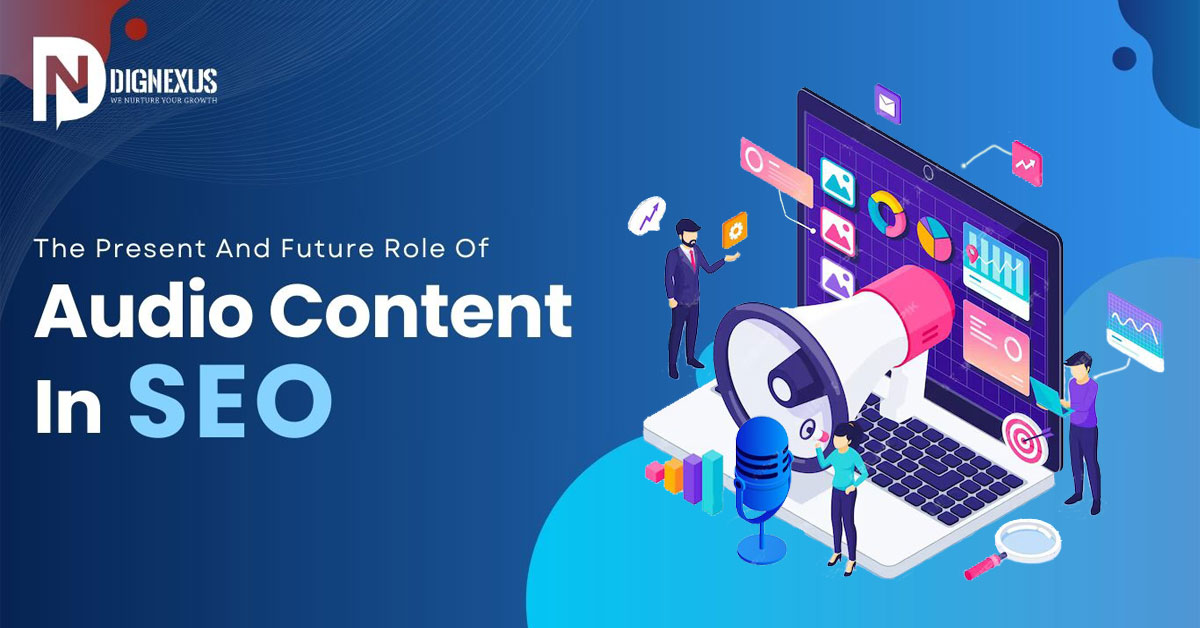
15
June
2021
The Present and Future Role of Audio Content in SEO
The introduction of voice search paved all its way back in 2010 when IBM introduced their voice system. IBM’s Watson is a powerful voice recognition question-answer computing system. In fact, the super-intelligent, thinking, and speaking robot was able to beat Trivial grandmasters.
However, in the following year, Google came out with its voice search while Apple released Siri for the iPhone 4S. By 2014, Microsoft launched Cortana. Besides, Google Assistant was established in 2016.
Since then, voice recognition has significantly improved, and Google claims to have 95 per cent accuracy. Also, this technology has slowly spread to devices that come under the category of the Internet of Things.
Fact: 20% of queries on mobile are made with voice, and 31% of smartphone users use voice at least once a week.
It is also predicted that 50% of the online search will be made through voice by 2023. This hints at a tremendous rise in voice search.
What Are the Effects of Audio on SEO?
Audio search is transforming our approaches to technology and the internet. However, one should emphasize whether it influences search engine optimization.
Tone
The exclusive audio recognition system allows voice technology to adapt and follow the language pattern. Here users can command the system as if they’re speaking to any other individual. However, there comes a barrier at some point; still, emerging technologies seek to enhance the user experience.

Keyword Length
Spoken language may not be as concise as the written word. Here queries may be longer than the usual three to four keyword searches. Voice searches have an average of 29 words in length. SEO strategists will need to adjust by utilizing more long-tail keywords. Also, remember, the longer the keyword phrases, the higher the probability of conversion.

Queries
Audio searches need more query words who, which, when, where, and how. These are generally reduced in written words. Meanwhile, the job of your digital marketer is to ensure content that delivers accurate and relevant answers to voice search queries. They equally need to distinguish between simple questions and those that require comprehensive solutions.
Questions with short responses typically help generate traffic to a website. Researches have shown that just 25 keywords trigger voice search. This may be in the form of question words or another form of terms commonly used as verbs, key nouns, and adjectives. These should be further worked into SEO strategies. Also, marketers should optimize content as per the questions of higher value.

Local Search
The voice search has focused on the use of local search. Consumers are more likely to search locally when searching by voice. Recent research has shown that 58% of consumers find local businesses using voice search. Besides, 46% use voice technology to find information on local businesses daily.
Marketers use the strategy of “near me” to optimize the content. This has more chances of generating leads.

Semantic Search
Semantic search targets a user’s search attempt to understand the intended meaning within the context. Such understanding is generally aided by other areas such as search history, global search history, the position of the user, and keyword spelling alterations.
The RankBrain from Google is an artificial intelligence system that helps to recognize words and phrases to enhance search outcomes. The thinking quality of the RankBrain allows query handling to a more complex level.
Another technology is the Hummingbird that helps natural language queries. It ensures search result pages are more relevant based on context and intent, allowing relevant pages to rank higher.

SERPs
Over 75% of voice search results will rank in the top three search engine result pages (SERPs). 30% of Google queries include featured snippets. These are extracts from any websites on the first page of SERPs. Moreover, businesses are given credit over both voice search and GUI searches. These brands only need to stick to the first page to be used to featured snippets.

Full Swing Utilization of Voice Search
Audio search is impacting SEO in various ways. Here are a few recommendations that brands need to make to adapt accordingly.
● Google Voice prioritizes quick loading websites, so the brand should ensure images are optimized, files get compressed, answer time is reduced, and the site stays entirely responsive.
● Make sure that your content is optimized with long-tail keywords that emphasize popular queries used in voice search. Also, give more focus on natural language.
● Featured snippets are summary answers from your web pages that can be used in position zero. To optimize the content, make sure you include identifiable extracts to be featured. Also, it should be easy for Google to read by using H-tags and bullet points.
● Ensure to provide local information to your brand as this helps meet increased search volume for local businesses with voice, .i.e., using Google My Business
● Enhance domain authority that helps you with search ranking. The addition of high-quality links can help improve the ranking.
Conclusion:
There’s an enormous change happening in digital marketing, and how you get the desired result is what matters. Audio Search and personal assistants are altering the landscape and presenting new challenges and opportunities for marketers to rethink their SEO strategy to accommodate such changes.
Some queries may need more than voice search; however, it makes sense to compare voice search queries against text searches for the limited subject where voice search queries are actually getting utilized.
If audio SEO becomes a thing, it would definitely give way to new forms of audio content. This may include spoken-word versions of articles, short sound clips answering a specific question, and more.


